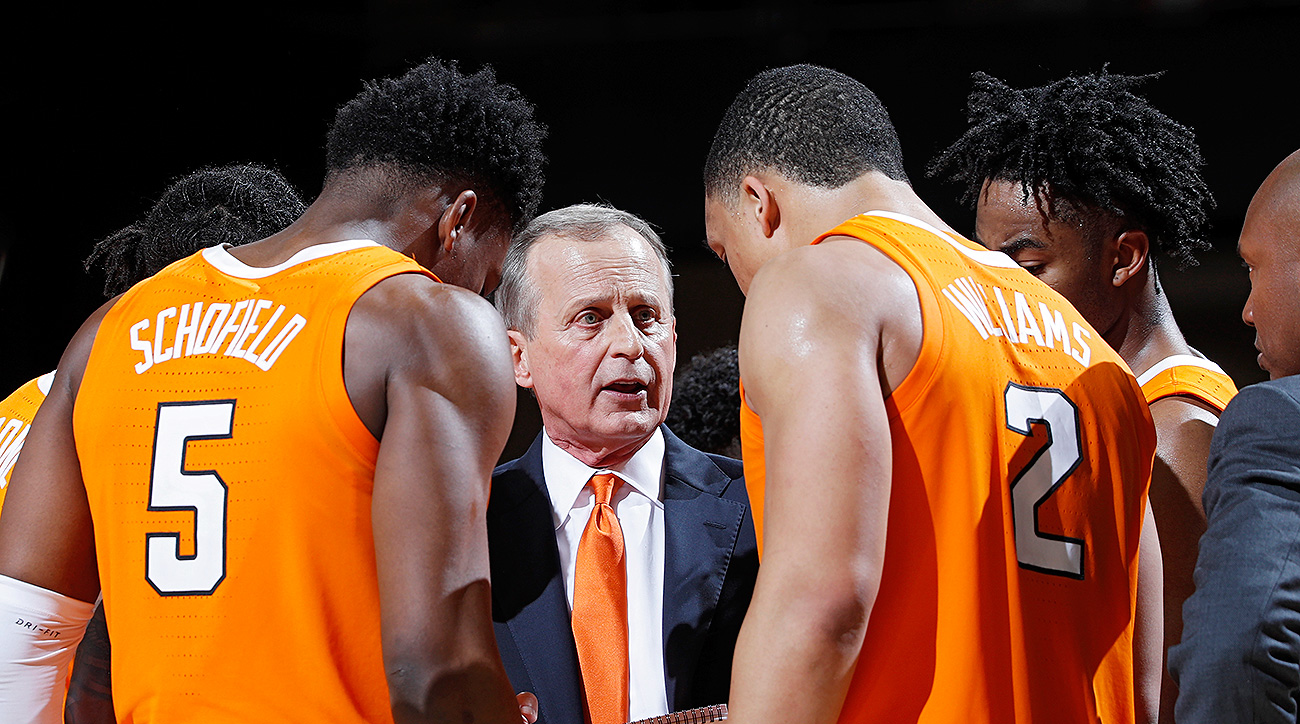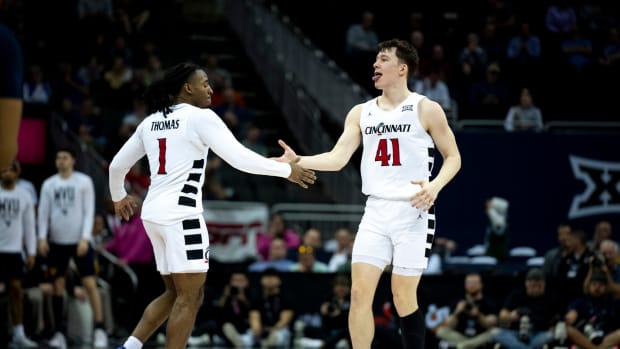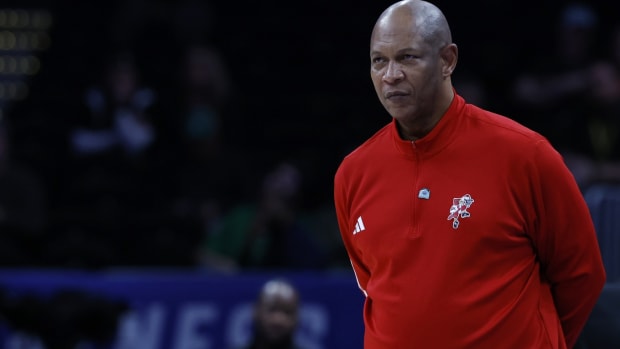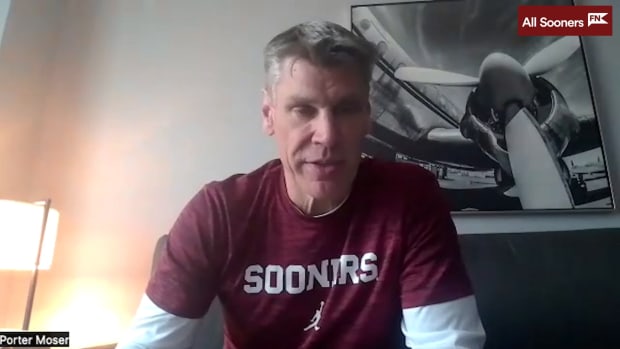Eight Top-Seeded Teams in the Most Danger of Losing Early in the Tournament
Never worry about busted brackets again! Sign up to play SI’s Realtime Bracket game. If your original pick is losing, you can switch it during live tournament games. Game leaderboards track original AND realtime picks.
For all the Selection Sunday talk about the toughest and easiest "paths" to the Final Four, the road ahead over the next three weeks of the 2019 NCAA tournament presents a similar challenge for all 64 teams that make it this far: Win three sets of two games, each containing a tight turnaround and an unfamiliar, motivated opponent. That mental and physical grind is unlike anything that happens during the regular season, and every year it reduces multiple presumed Final Four contenders to rubble.
Can anyone really see those collapses coming? Maybe not—but we can try. A handful of teams that earned top-four seeds in their respective regions of the bracket reside in the Danger Zone, with some fatal flaw, nightmare matchup or bad karma looming that could thwart their Sweet 16 hopes.
Last year's inaugural Danger Rankings correctly sniffed out the trouble ahead for Cincinnati, Xavier, Arizona, Michigan State and Auburn, which all failed to survive the first weekend, some more honorably than others. (It whiffed on Texas Tech, though; the Red Raiders had all the makings of a Final Four team until they ran into the eventual national champs Villanova in the Elite Eight.)
Now, it's time to sound an early alarm for a new set of top seeds. They may not get bounced in the first round—at least, not all of them—but make sure you've turned over every stone in your research before hitching your wagon to any of these seven squads for a deep March run.
Tennessee (No. 2 seed, South Region)
You may have already cooled on the Vols after they lost four of their final 10 games to end the year, following a rousing SEC tournament semifinal win over Kentucky with a blowout loss to Auburn on Selection Sunday. But there were moments prior to that late fade that should have sounded an alarm, such as the January week in which Tennessee nearly lost at home to Alabama and then needed overtime to beat Vanderbilt, the first team to ever go 0–18 in SEC play. After becoming Loyola-Chicago's second victim last March, Rick Barnes's veteran team won't overlook anyone, but it may not overwhelm anyone, either. The skill sets it may encounter in the South Region appear to be either so similar that the scheme matchup's a wash or so different that Tennessee will be playing out of its comfort zone.
The Vols can connect from deep just fine, but as Auburn exposed in early March, they really would prefer not to get into a long-range shooting contest—threes make up fewer than a third of their total field goal attempts, per kenpom. That's exactly what they'd get in the Sweet 16 if either Villanova or Purdue were to join them in Louisville.
Michigan (No. 2 seed, West Region)
The Wolverines looked like the best team in the country before Christmas, smashing Villanova, North Carolina and Purdue, among others, with their defense leading the way. But since the calendar turned to 2019, they have leveled off to merely great, as what amounts to a six-man rotation struggled to recover from off nights for one or two contributors.
Michigan drew into a nasty region full of teams good enough at one specific thing to either press that offense into action or demand a reprisal of the defense's early-season dominance. Potential Sweet 16 foe Texas Tech has an equally relentless defense and a hotter offense. Someone like Nevada or Buffalo could force the Wolverines into an track meet even before they get to Gonzaga (or perhaps ultra-long Florida State or sharpshooting Marquette) in the Elite Eight. Even No. 15 seed Montana is one of the best shooting teams in the country, sitting seventh in effective field goal percentage. Few coaches successfully reshape their teams to the situation like John Beilein, but those skills will be tested early and often in the West.
Kansas (No. 4 seed, Midwest Region)
Kansas State (No. 4 seed, South Region)
We're grouping together the Sunflower State rivals because they fall right on the cut line for the Danger Zone as No. 4 seeds and are similarly surrounded by teams that could prove to be bad matchups. The embattled Jayhawks ended up in a four-team pod with three teams who love to shoot the three, so if they quash the upset hopes of senior guard Vasa Pusica and Northeastern, they're in for an extremely uncomfortable game against SEC champion Auburn or WAC champion New Mexico State.
Meanwhile, Kansas State was dropped into San Jose alongside two other high-major teams with excellent defenses (Wisconsin and Oregon, both top-20 in kenpom's defensive efficiency) and a first-round opponent in UC Irvine that leads the nation in shooting percentage allowed on two-pointers. Waiting in the Sweet 16 could be Virginia, another team with a defense of some acclaim. The Wildcats may get to play the style of game they want throughout this tournament, but they may not like how it ends.
Purdue (No. 3 seed, South Region)
Boilermakers point guard Carsen Edwards is one of the best players in the country, but any team that has one player take 37.1% of its shots—as Purdue does with Edwards—runs the risk of falling apart when that player has an off night from the floor, as Edwards has multiple times down the stretch. Look at some of these clips since Feb. 3: 6-for-20 against Minnesota (a win), 8-for-27 at Maryland (a loss), 4-for-24 at Indiana (an ugly win), 3-of-16 at Nebraska (another ugly win), 4-for-17 against Minnesota again (a Big Ten tournament loss). No offense can brush off that many misses by one player in March, when the rims appear to get tighter for almost everyone, and the South Region promises to be especially unforgiving on defense.
North Carolina (No. 1 seed, Midwest Region)
The Tar Heels draw the short straw as the top-seed representatives on this year's list, even though their blowout second-round loss to Texas A&M in 2018 makes it a little less likely they overlook Utah State or Washington in the second round in Columbus. UNC's playing style takes a certain percentage of upset hopefuls off the table; if you can't bang inside and run back on defense, Roy Williams teams will make you pay. If fifth-seeded Auburn reaches the Sweet 16, the Heels would have to deal with one of the few comparable chaos merchants in the field. Senior forward Luke Maye is averaging a double double, but he has faded to the background during a few games against quality opponents that have some length inside. Freshmen Coby White and, with time, Nassir Little are essential parts of UNC's attack. They can't look like first-years as the stakes and quality of competition continue to rise.
Texas Tech (No. 3 seed, West Region)
The Red Raiders would be a bad matchup for Michigan in Anaheim, but they have to make it there first. If seeds hold, a second-round matchup with Buffalo, which deploys multiple senior scorers and plays the shortest offensive possessions of any tournament team, could bring Texas Tech out of its rhythm, especially if threes aren't falling the way they began to down the stretch in Lubbock. And if you want to get really pessimistic, No. 14 seed Northern Kentucky has on its résumé two admirable 13-point road losses to AAC teams (UCF and Cincy) with top-40 kenpom defenses, so it's not as if the Red Raiders will be the first rough-and-tumble team the Norse have ever seen. Texas Tech may not see an elite offense before it would face Gonzaga in the Elite Eight, but if no one steps up around do-it-all sophomore Jarrett Culver, Tech has bigger problems than the Zags.
LSU (No. 3 seed, East Region)
The Tigers have a lot of factors working against them. This is the highest seed the program has earned since it was a No. 1 in both the 1980 and ’81 tournaments. The first-round opponent is Yale, which knocked off a similarly imposing Baylor team during its last trip to the tournament in 2016. The second-round opponent would be either Maryland, which has the athletes to hang with slippery guard Tremont Waters and the bigs to match Naz Reid and Kavell Bigby-Williams, or Belmont, a trendy second-weekend Cinderella pick. Oh, and did we mention that LSU won’t have its head coach?
There’s no end in sight to Will Wade’s suspension as the school looks into reports of a leaked wiretap in which he is heard discussing a “strong-ass offer” made in the recruitment of a current player with one of the runners charged in the FBI’s investigation into college basketball recruiting practices. While interim coach Tony Benford didn’t make any glaring errors in LSU’s last-second loss to Florida in the SEC tournament quarterfinals, steering a team through the chaos of the NCAA tournament is a tall order for full-time head coaches, let alone assistants being thrust into the big chair.





